ESG in a decarbonised Northern Ireland
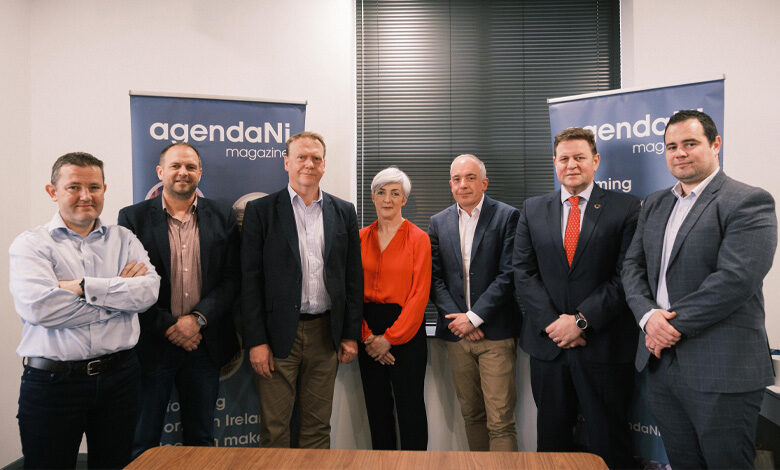
NIE Networks hosted a round table discussion with key stakeholders across various sectors to discuss the role of environmental, social, and governance (ESG) in reaching net zero.
What are the benefits and opportunities of an organisation-wide focus on environmental, social and governance outcomes?
Gillian McKee
A major benefit is employee attraction and retention. Surveys show that around two-thirds of Gen Z employees consider company sustainability when choosing an employer. When building a workforce for the future, it is an important consideration. Companies that move quickly will have a competitive edge in the recruitment market. In the longer term, there are cost efficiencies for organisations that reduce their dependency on fossil fuels, particularly if emission reductions are passed along the supply chain. And a key benefit has to be building stakeholder trust by being transparent about your impacts on people and planet.
Gareth Walls
The attraction and retention of the best talent are exceptionally important drivers because all of our industries and businesses are founded upon our people. If you can get the cultural understanding correct through recruitment and retention, then you can make ‘good ESG’ not just a cultural norm for the business, but a cultural necessity. However, there is also a more defensive aspect, which manifests as legal compliance. This is not just an esoteric concern; compliance with legislation and regulations requires a comprehensive approach to protect the corporation and the individual.
Geoff Nuttall
There are potentially great cost efficiencies complementing the environmental benefits of moving to net zero, however, limited resources mean that not every business or organisation is practically able to consider all the ESG ramifications of their business operations. A lack of cost-effective and free support for smaller and less-resourced organisations to make that journey is a barrier to achieving those benefits and opportunities.
Mark Palmer
One major benefit is the creation of shared values. An organisation-wide focus on ESG will require conversations around what an organisation’s values are, mandating engagement with a diverse range of stakeholders and voices. This is a boundary-spanning opportunity, and we know that greater diversity enhances performance for teams.
Robert Clements
The evidence shows there are long-term benefits to having a sustainable business model. Take decarbonised heat for example, there are clear economic benefits to investing in an indigenous, sustainable fuel source, but there are also wider benefits, including better health outcomes for householders. From a governance point of view, compliance is essential, but fundamentally, it is the right thing to do. There are clear benefits of an ESG focus in attracting investment, in recruiting talent, and in lowering operating costs, but fundamentally, the major benefit is a plan of action for our people, the planet, and delivering prosperity.
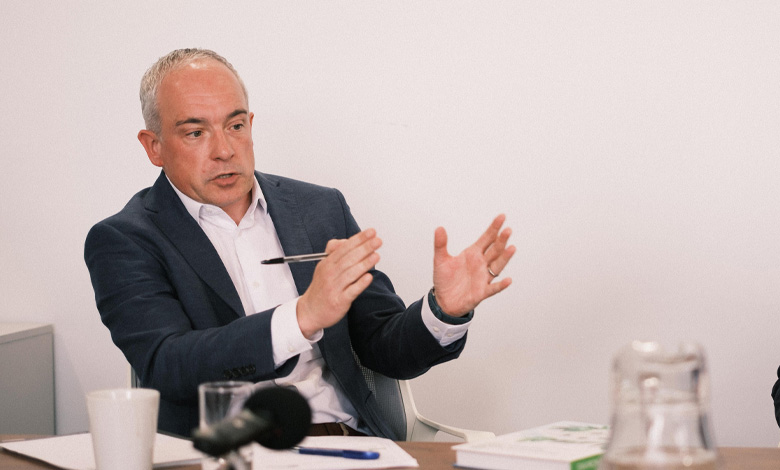
“The idea that we can be sustainable businesses whilst using less is the ultimate answer to all of this.” Derek Hynes
Derek Hynes
ESG is a fundamental tool to understanding and promoting the purpose and mission of an organisation. The challenge for organisations, and NIE Networks is no different, is to truly embed those values in your operations. There are specific tangible benefits, for example, when we go to debt markets, unless your ESG reporting shows you are doing the right things as an organisation, you either do not get money, or you pay a lot more for it. There is also a compliance element, ultimately, you have to know that the fabric of an organisation will deliver on your ESG responsibilities, but it must come from the heart of an organisation in terms of its purpose. This cannot be just another tick box exercise.

Can the creation of comprehensive and supportive governance, risk, and control (GRC) frameworks better prepare organisations for a net zero future?
Robert Clements
I believe they can, especially in relation to risk. A lot of discussions on net zero centres on climate mitigation but not enough on climate adaptation. Currently, there are 45,000 houses in Northern Ireland deemed at risk of flooding, and the cost of adaptation will be in the tens of millions. The reality is that it is often the most socially vulnerable that live in these areas. If we are striving for a just transition, we need to think about adaptation and businesses need to understand their level of resilience to the future climate. Doing this properly can improve a business’s credibility with the public, and with potential investors.
Gillian McKee
Yes, to a degree. Frameworks are important to ensure that organisations are managing future risk and putting an environmental lens on their decision-making. However, I do not think public trust centres on frameworks, but on tangible action. ESG reporting is still largely being driven by investor requirements when it really needs to be focused on humanity’s requirements. To achieve that, organisations must be committed to sustainability and have that commitment built into their operations.
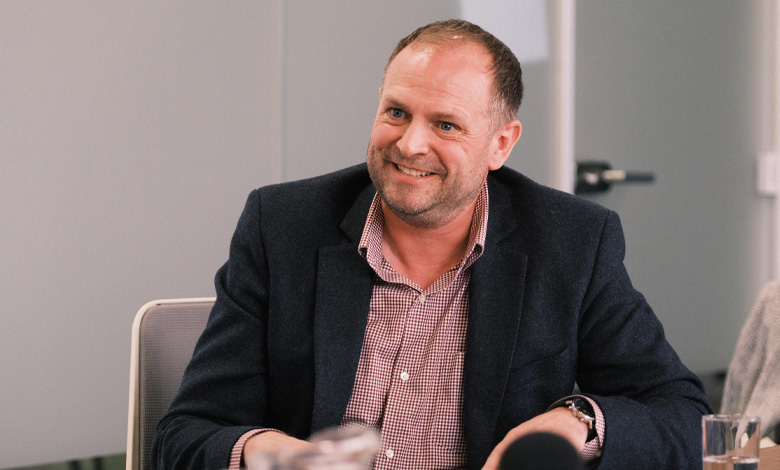
“When instituting change in the system, we must be mindful of the impact on people and their values over the long run.” Mark Palmer
Geoff Nuttall
Good frameworks, rigour and credibility are very important, but it is worth highlighting that there are a lot of different frameworks and accreditation systems out there, some more credible than others. It can be very resource intensive to keep up with different systems and I think the challenge is how do we encourage organisations to take up GRC frameworks without making it overly burdensome? Taking the community and voluntary sector as an example, time and resources are scarce, and what they are doing might well be delivering on those decarbonisation themes, but how do they systemise that in a way that recognises their capacity?
Gareth Walls
ESG is not a new concept and therefore, an awful lot of the structures for getting it right already exist. In recent times the terminology of ESG has broadened, and rightly so, to become an umbrella term for the ‘right thing to do’ in many aspects of society, law, and the environment. Corporate governance frameworks are unattractive, but they are an absolute necessity. Where the link between these frameworks and environmental goals fails is when organisations use such frameworks to communicate ESG credentials to the market, which they simply do not have. The worst instances are often described as greenwashing or virtue signalling. While the law is often slow to deal with this, the court of public opinion is not and such claims can be fundamentally destructive to a business, an organisation, and its people.
Derek Hynes
Governance is most valuable when you can move away from reporting what has happened in the past and utilising it to help predict the future. Organisations of any size are constantly balancing the competing demands for people, finance, and capability, but if you do not do the governance, risk reporting, and compliance correctly, you are stabbing in the dark when deciding where to invest scarce resources. In relation to net zero, governance has a role in the sense that as we look at reducing Scope 1 and Scope 2 emissions, we are also engaging in supply chains that are doing the same. Governance has its part in that self-fulfilling circular of moving towards net zero.
Mark Palmer
I would suggest that organisations need to take a step back and find perspective. The energy transition is a complex problem and puzzle. Having oversight of the multiple parts and how they fit together will be important. Portfolio driven approaches can help but I would caution on the one-size-fits-all approach with GRC.
What does a strong social impact strategy comprise of, and who are the beneficiaries?
Derek Hynes
We are a large organisation with a premium carbon footprint. We have an impact on nature and have had for 100 years. The most important thing is for our staff to see us accept that history and accept the responsibility we have to do things differently in the future. The consequence of not doing this is that people will not buy into the employment prospect with NIE Networks. There is also an issue of public trust. If NIE Networks wants to have access to farmland and precious environment, to build and maintain our infrastructure, then the communities need to know that we are being open and honest, and that we are doing the right thing.
Geoff Nuttall
Issues like climate change are pan-societal, and mitigating climate change benefits society as a whole, but a strong social impact strategy targets areas of greatest social need and social impact. A social impact strategy gets strength through credible action. There is a role for a measuring system, but a strategy needs to detail what is being done differently because of climate change, and what are the outcomes.
Mark Palmer
It comprises of tangible actions. I would caution against just using one framework, because that could lead to a situation where organisations are effectively hitting the same problems with the same tool, repeatedly. It will require a diversity of tools as indicators. For example, we often see a new building being opened and the environmental impact or habitat credentials are boasted, but often the social and behavioural impact falls off. It is important to understand how infrastructure developments impact people’s lives and broader civic society. Our universities can play a key role in understanding this with research.
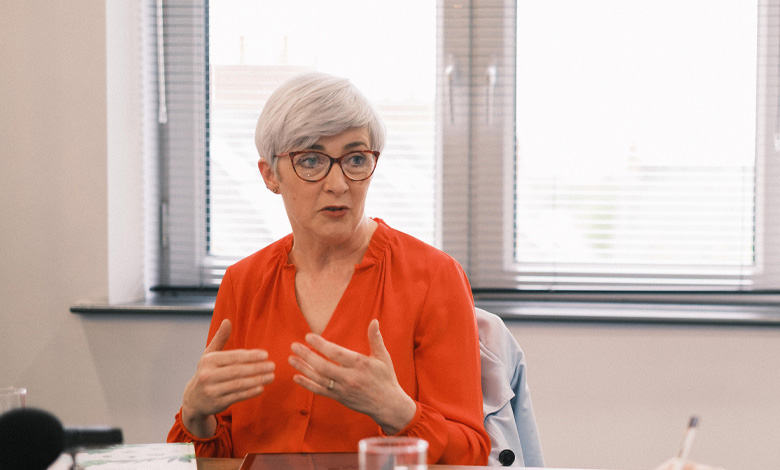
“ESG reporting is still largely being driven by investor requirements when it really needs to be focused on humanity’s requirements.” Gillian McKee
Gillian McKee
Historically, when corporate social responsibility was the buzz word, a social impact strategy related to a charitable donation, fundraising, and engaging with the local community. It is much broader now. For me, a strong social impact strategy is one where the company looks at its social impact at every stage of its value chain. It is not just about your own local communities; it must go far beyond that. To quote a former colleague: “Social responsibility is not about how you spend your profits, it is about how you make them in the first place.”
Gareth Walls
There are two elements to a strong social impact strategy. Firstly, it starts with boardroom responsibility, and should not be delegated down to a lower level of the management chain. It should also be flexible, recognising that if an organisation makes a start, there is space to learn from mistakes and adapt. Secondly, societal impact starts with the immediate internal consequence for our employees and those we wish to employ; however, the next level of impact is broader and is external to the organisation, in Northern Ireland and globally. Underlying legislation, such as Section 54 of the Modern Slavery Act deals with corporate responsibilities. It not only expects an entry level compliance threshold but every year, it anticipates improved awareness and contribution of oversight, not just into its workforce, but also of its supply chain. The obligation for corporate Northern Ireland is to investigate those suppliers whose raw materials come from the global market, and ensure they are meeting the base requirements of legislation.
In terms of social impact through recruitment, there must be recognition of the need to modernise our processes. For many years, recruitment in Northern Ireland has been focused on religious belief, political opinion, and community background. However, if you think of true diversity, there must be recognition for things like neurodiversity, social mobility, and apprenticeship opportunities for the many fantastic candidates who may not be university educated. A good social impact strategy and policy therefore focuses on how to make an organisation ESG compliant, whilst also assessing how that approach can benefit wider society.
Geoff Nuttall
A good social impact strategy is flexible and adapts its message for different audiences. At NICVA, we have been having our net zero conversations at board level, but we also have internal staff groups to operationalise things in practice and we are now looking to our sphere of influence, which is our members and our sector. That is not necessarily a one-size-fits-all approach when it comes to the framework uses. For example, we might be using a greenhouse gas framework to frame policy for our board, but our internal staff groups have got a much more simplified way of looking at the key environmental drivers. As long as the systems do not get in the way of the urgency then we should not be tied to one system and trying to make that the only system.
With the environmental pillar score of ESG rating being increasingly used as a tool to align investments with a low-carbon transition, what are the priority areas of focus for organisations to drive environmental benefits?
Mark Palmer
A priority focus must be placed on Scope 3 emissions. I have been developing a piece of work for the Department for the Economy which looks at international supply chains in relation to the sourcing of critical minerals and one of the standout findings is that across the energy transition, there is very little knowledge around Tier 2 and Tier 3 suppliers. That means it is going to be a challenge, because how can organisations get to net zero if we do not fully understand their supply chains?
Robert Clements
Scope 3 emissions is the new frontier; we estimate that 99 per cent of the Housing Executive’s carbon footprint are from Scope 3 emissions. Our priority is ensuring that we deal with the most vulnerable first, and we believe that empowerment and behavioural change through education are critical. A typical house produces four tonnes of carbon per year, but a typical person produces 10 tonnes of carbon per year, so tackling behavioural change will be key to achieving a just transition.
Gillian McKee
A focus on Scope 3 is important in the short term, because smaller companies in the supply chain will not get to net zero on their own. I think it is important to recognise that priority environmental areas are going to differ between sectors, but are likely to include energy efficiency, emission reduction, resource use, and circularity. A report from the Ellen MacArthur Foundation estimates that around 45 per cent of emissions can be targeted by looking at circularity across key sectors. Nature and biodiversity are also critical, particularly when you consider that in Northern Ireland 26 per cent of carbon emissions are coming from agriculture.
Geoff Nuttall
One area of focus is land use; however, it is not a mainstream conversation yet. Conversations around things like rewilding can become controversial because it requires a difficult transition from our current model, but it is a conversation we must have.
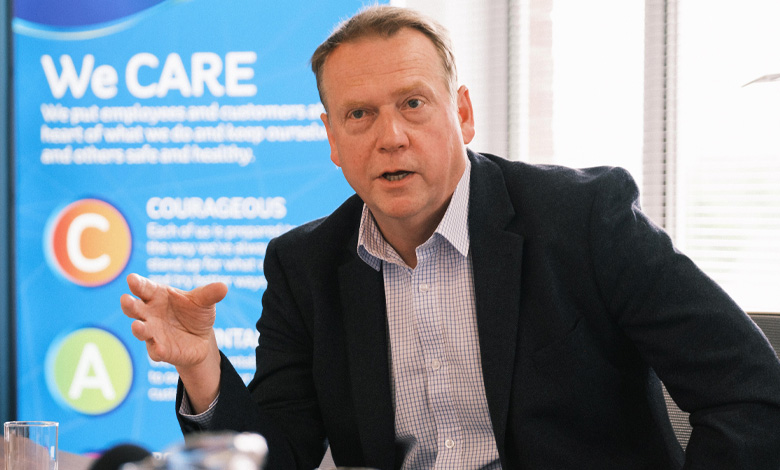
“A strong social impact strategy targets areas of greatest social need and social impact.” Geoff Nuttall
Gareth Walls
When discussing ESG ratings and its scoring, you cannot step away from the cost of money, the cost of lending, and the way banks and financial institutions are approaching investment based on their ESG credentials. The other side, however, is social value through procurement. This provides a real opportunity for large business to partner with the organisations that need significant assistance. Some view the marrying of two organisations to ensure the greatest ability to score highly on social value cynically, but it is one of the quickest ways to ensure good ESG scoring and help those in the community who need it most. I think this is an opportunity we all need to be more aware of.
Geoff Nuttall
Our sector comprises of organisations who provide a large infrastructure to reach communities of interest, in whatever section of society you want to reach. I do not think that is fully understood and as a result, it is an untapped resource.
Derek Hynes
Something we do not talk about enough is the idea of degrowth. We can not continue to grow and consume. It is not an easy conversation for any business to have because most of our futures depend on a model of consumers buying and using our services. The idea that we can be sustainable businesses whilst using less is the ultimate answer to all of this. We also have a role in changing behaviours. We must recognise the inter-generational nature of all of this and that we have an opportunity to help the next generation understand and realise the environmental benefits.
Outline one priority for how organisations can best ensure their ESG agendas align to a common cause for better outcomes.
Derek Hynes
I think it is critical that organisations listen. This is an adaptive challenge for everybody, so we have to offer our perspective, but we also must be willing to listen to others. We must engage with people and adapt our approach, otherwise the transition does not come together.
Robert Clements
I would suggest that organisations ensure that their mission statement is wrapped in sustainable practice. Our Chief Executive set out a mission statement that everyone should live in an affordable and sustainable home, within a climate-resilient environment to meet their needs. That statement wraps the needs of a sustainable life and sustainable living into the very fabric of everything we do, and it comes from strong leadership from the CEO and the board.
Mark Palmer
I think there is a need to be mindful of people – about humans and how they feel about the many changes and demands. As ESG has become more prominent and significant, the behavioural practice around sustainable business model credentials must also stand up to scrutiny. At the same time, equally, it is important that we are mindful of this question: When does measuring everything that moves become intolerable for employees, communities and humanity more generally? All management tools, visual dashboards and ESG measurements produce unintended behavioural consequences that are not always seen immediately. When instituting change in the system, we must be mindful of the impact on people and their values over the long run.

“A strong social impact strategy targets areas of greatest social need and social impact.” Geoff Nuttall
Geoff Nuttall
Ensuring organisations with the greatest reach and best understanding of social vulnerabilities are properly resourced. Our sector comprises 7,500 organisations with a core aim of delivering environmental and social value, they represent a litmus test as to how a much wider benefit we can bring. Making connections with these organisations is key.
Gareth Walls
If this is to have meaning, then organisations have got to be committed to ESG and that commitment must be authentic. Without integrity in the approach the policy will fail and customers, clients, and colleagues will see through that.
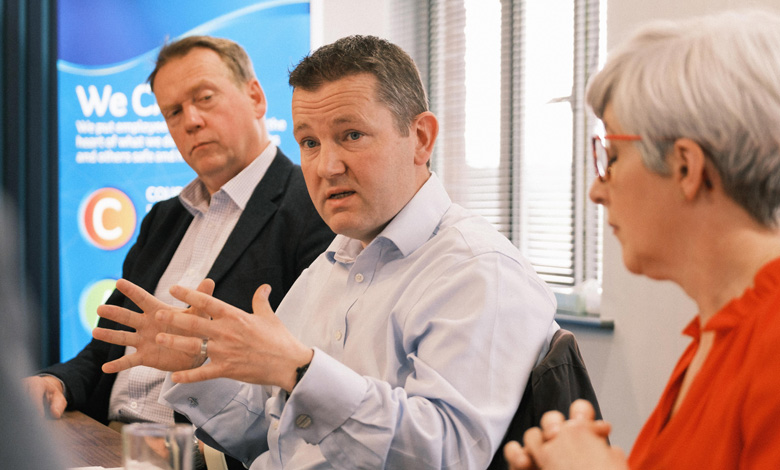
“Without integrity in the approach the policy will fail and customers, clients, and colleagues will see through that.” Gareth Walls
Gillian McKee
If organisations are looking for global frameworks and common outcomes, then the UN Sustainable Development Goals represent a good example. They are not just for the third world, as many people assume, they are about the planet, people, prosperity, peace, and partnerships. Organisations can use these goals to see where they align and where they can have the biggest impact.
